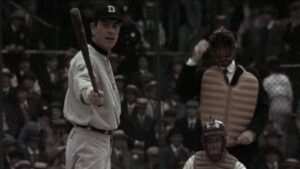Cobb (1994) review
Dir. Ron Shelton
By: Steve Pulaski
Rating: ★★★
Tommy Lee Jones may not look much like the infamous ballplayer Ty Cobb, but he sure does embody his spirit, hatred, and consistent belligerence wonderfully. To play a person of his magnitude certainly requires ambition and drive but also talent and diversity. Jones tackles the player with the hatred and evilness that many archived articles and reports have claimed he proudly wore with piercing accuracy.
Today, in 2012, baseball players are often viewed as “heroes,” “role models,” and sometimes even people who provide us with more motivation and passion than those we know in real life. Players like Starlin Castro, Alfonso Soriano, and Jim Thome have etched themselves into the hearts of many. Cobb would’ve etched himself in the dark side of someone’s heart. He was a racist, sexist, selfish, mean-spirited, cocky, gun-toting ignoramus who hated everyone except himself. He thought of himself as “the sport of baseball,” completely shunning teamwork and thoroughly enjoyed being hated by literally everyone in the audience. He thought the fact that they showed up to the stadium to throw food and garbage on him was the highest compliment someone could pay.
The film centers around not his baseball career, but how a famed sportswriter had the questionably fortunate opportunity to dig into Cobb as a real person in 1959. That man was Al Stump (Robert Wuhl), who was hired to act as a ghostwriter for Cobb’s autobiography. Initially, Stump is incredibly honored and thrilled to be given such a job, being able to spend days and nights with “the best baseball player of all time.” But when Stump arrives, he is immediately greeted with loud rants from a writer who walks on him and we eventually see Cobb, as he lies in bed, frail and uninspired, verbally assaulting the poor man as he tries to simply reason with him and remain civil.

Cobb suggests that him and Stump drive down to Reno to have sex with random women – an act he hopes to accomplish before he dies. He insists on driving recklessly through a terrible blizzard and, as he slips and slides down the road, Cobb briefly illustrates his baseball history for Al.
You’d believe the film was told entirely in flashback, but the flashback ceases only after a few minutes and we are back in the present with Al and Cobb, and that’s where we remain for the remainder of the picture. It is widely known that Stump published a book shortly after spending days on end with Cobb, but that was the fabricated version he was conned into writing for the man, which the film heavily explores. Al secretly kept a real recollection of his treatment and relationship with the man, but resorted to scribbling notes on cocktail napkins, small pieces of paper, etc. He then released a book detailing the true accounts of the man years after his death – accounts that are depicted in this film.
Ron Shelton’s Cobb is far from a perfect biopic. It’s a little choppy, somewhat dry in sequences, and may run twenty minutes too long, but the fact that it humanizes an unbelievably despicable character, is written with little tongue in cheek innuendos, and the fact that it showcases many honorable performances makes it one that proves its existence nicely.
Starring: Tommy Lee Jones, Robert Wuhl, and Lolita Davidovich. Directed by: Ron Shelton.
About Steve Pulaski
Steve Pulaski has been reviewing movies since 2009 for a barrage of different outlets. He graduated North Central College in 2018 and currently works as an on-air radio personality. He also hosts a weekly movie podcast called "Sleepless with Steve," dedicated to film and the film industry, on his YouTube channel. In addition to writing, he's a die-hard Chicago Bears fan and has two cats, appropriately named Siskel and Ebert!


